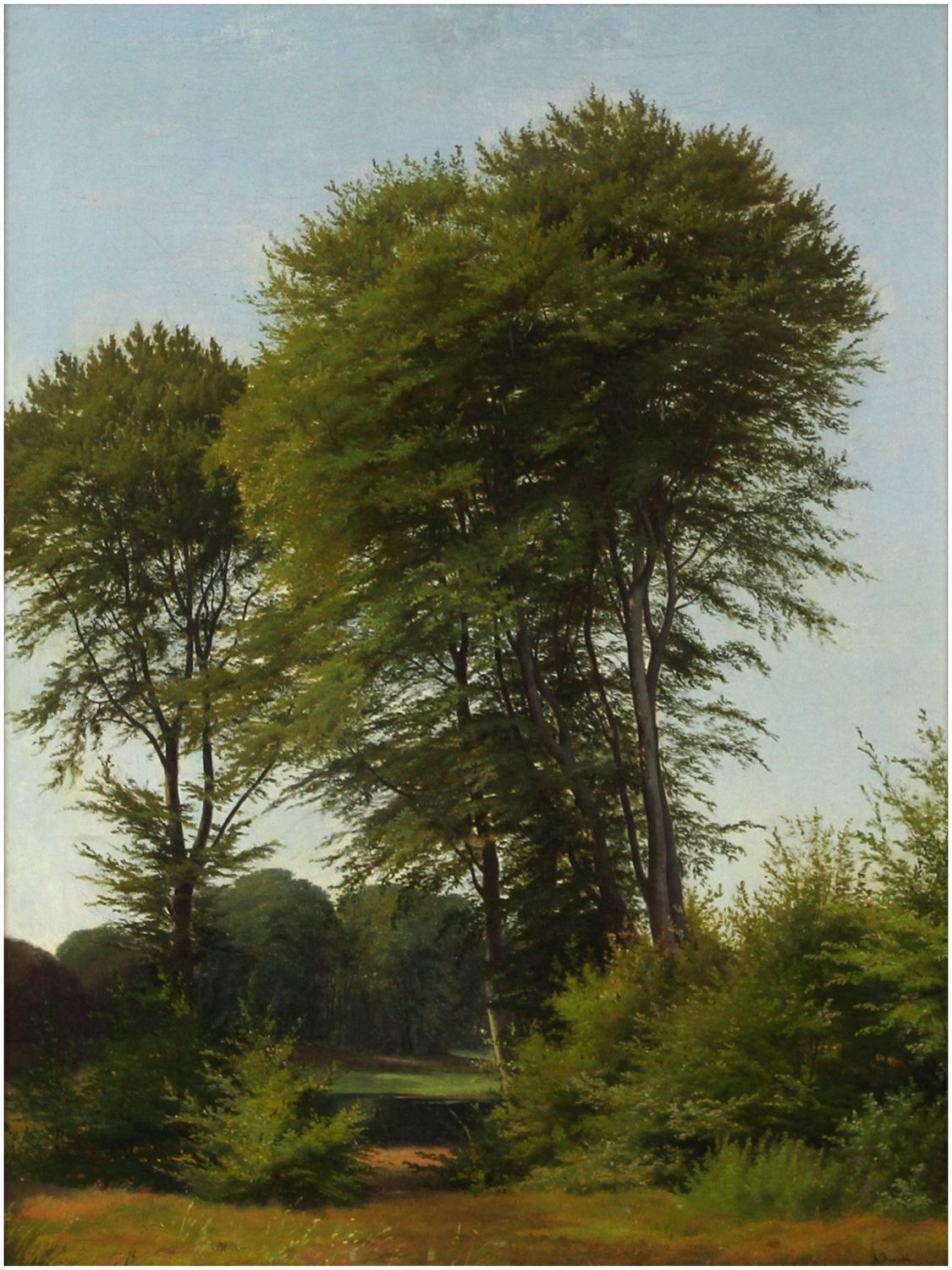Juuel, Andreas Thomas (1816-1868), Sommerlandschaft mit hohen Laubbäumen an einem See
Andreas Thomas Juuel(1816 Kopenhagen - 1868 Kopenhagen). Sommerlandschaft mit hohen Laubbäumen an einem See. Öl auf Leinwand, 54,5 x 42 cm (Innenmaß), 71 x 58 cm (Rahmen), signiert unten rechts "A. Juuel". Elegant profilierter Goldrahmen.
- Ewige Sommerstille über einem abgründigen See
-
Das Bild zeigt eine Ansammlung filigraner Laubbäume vor einem hellblauen, weißlich leuchtenden Himmel. Die helle Fläche des Himmels kontrastiert mit der ebenfalls ungetrübten dunklen Wasserfläche des Teichs, auf den sich die Baumgruppe portalartig öffnet. Durch eine ähnlich summarische Behandlungsweise sind Vorder- und Hintergrund zusammengezogen. Sie bilden eine aus wechselnden Braun- und Grüntönen bestehende Kontinuität, innerhalb der sich die detailliert durchgearbeitete Baumgruppe des Mittelgrundes als Protagonist des Bildes profiliert, der gleichermaßen nah wie distanziert wirkt und zu einer sich in die Details vertiefenden Betrachtung herausfordert. Und tatsächlich offenbaren sich dem nahsichtigen Blick bisher nicht wahrgenommene Phänomene - wie die Lichtspiele auf den Baumstämmen, die auf derselben unscheinbaren Ebene angesiedelt sind, wie die im Vordergrund einzig angedeuteten Gräser oder das die dunkelgrüne Wand des hinteren Haines durchbrechende Licht.
Der Blick vermag sich immer wieder aufs Neue in die Naturphänomene der Szenerie zu vertiefen, wobei die ganze Darstellung von der zart-sensiblen Aura einer transluzid wirkenden Feinmalerei getragen wird, die in sich das Geheimnis des dunklen Sees und des überblauen Himmels birgt.
zum Künstler
Andreas Thomas Juuel nahm 1832 eine Lehre an der Königlichen Porzellanmanufaktur Kopenhagen unter G. Hetsch auf und besuchte parallel dazu die Kunstakademie. 1853 wurde er an der Porzellanmanufaktur Bing und Gröndahl angestellt, deren Leiter er 1857 wurde. 1862 erhielt er, nicht zuletzt aufgrund seines künstlerisches Engagements für die Manufaktur, die Verdienstmedaille in Gold. Ein Höhepunkt seiner Tätigkeit als Porzellanmaler ist das 1861 ausgeführte Prachtservice für den Dänischen König Friedrich VII., das heute im Museum von Bergen ausgestellt ist.
Juuel war neben seiner Tätigkeit für die Porzellanmanufaktur aber auch freischaffender Maler und von 1836 bis 1855 an den jährlichen Akademieausstellungen beteiligt. 1847 gewann er mit seinem Bild "Stürmischer Herbsttag" den Neuhausen-Preis, den er bereits zweimal als Porzellanmaler errungen hatte: 1843 für ein Porträt des Predigers Jens Hornsyld und 1845 für eine Landschaft nach Louis Gurlitt.
In beiden Sparten begabt, hat Juuel die Hochkunst mit der Porzellanmalerei verknüpft, was sich für die Porzellankunst in der Adaption der Englischen Landschaftsmalerei niederschlug, während insbesondere Juuels Landschaftsgemälde von der zarten transluziden Wirkung der Porzellanmalerei profitierten. Eine weitere Zuspitzung erfuhr die von einem Eigenleuchten getragenen Farbwirkungen in Juuels Aquarellen, die er für eine Hinterleuchtung als Transparente angefertigte.

